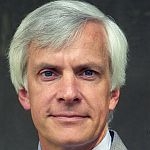 (Host) Robert Frost died fifty years ago tomorrow at the age of eighty-eight. Here’s commentator and Vermont Humanities Council executive director Peter Gilbert to tell us about the last days of a man that scholars generally now recognize as one of America’s greatest poets.
(Host) Robert Frost died fifty years ago tomorrow at the age of eighty-eight. Here’s commentator and Vermont Humanities Council executive director Peter Gilbert to tell us about the last days of a man that scholars generally now recognize as one of America’s greatest poets.
(Gilbert) The fall of 1962 was particularly busy for Robert Frost, with not only numerous talks and events but also a trip to the Soviet Union and a meeting with Khrushchev. On November 27th , he spoke at Dartmouth’s brand new Hopkins Center. His talk was entitled "On Extravagance." He was, in short, in favor – in favor of extravagance in that new art center, in the universe, in poetry. Frost said, "Though a Vermonter and all that – I never took any stock in the doctrine that ‘a penny saved is a penny earned.’ A penny saved is a mean thing, and a penny spent is a generous thing and a big thing."
The other subject on his mind that evening was clearly mortality. Toward the end of his talk he said a poem entitled "Away!" in which, biographer Lawrance Thompson writes, he seems to anticipate his own death with equanimity. The poem ends this way:
Unless I’m wrong
I but obey
The urge of a song:
"I’m – bound – away!"
And I may return
If dissatisfied
With what I learn
From having died.
He ended his talk with a more somber poem, "The Night Light," which suggests that Frost did, in fact, face death with some dread: [quote]
She always had to burn a light
Beside her attic bed at night.
It gave bad dreams and broken sleep,
But helped the Lord her soul to keep.
Good gloom on her was thrown away.
It is on me by night and day,
Who have, as I suppose, ahead
The darkest of it still to dread.
Frost had long been troubled with chronic cystitis, and six days after his talk at Dartmouth, he was admitted to Peter Bent Brigham Hospital in Boston. He agreed to go with great reluctance. "If I ever go into that place," he said, "I’ll never come out alive."
On December 10th he was operated on. The prostate proved cancerous, the cancer had spread to the bladder, but they thought they got it all. On December 23rd he suffered a pulmonary embolism, which damaged his heart. He suffered another on January 7 and underwent surgery. Over the following days, he worked on a poem, dictated a letter, and saw friends one or two at a time. Everyone knew it was time for final words.
On January 27th, he began to fail rapidly. Biographer Lawrance Thompson tells us that when his primary physician came by without his usual entourage of medical students, Frost understood. "Traveling light today, aren’t you?" he said.
That night new blood clots traveled to his lungs, he lost consciousness, and died shortly thereafter.
A private service was held two days later in Memorial Church in Harvard Yard for thirty friends and family members. On February 17 th seven hundred people attended a memorial service at Amherst College. In June, his ashes were buried in the family plot in the cemetery of the First Congregational Church of Old Bennington. His epitaph comes from one of his poems. It reads, "I had a lover’s quarrel with the world."
Excerpts from "Away" and "The Night Light" from the book THE POETRY OF ROBERT FROST edited by Edward Connery Lathem. Copyright © 1947, 1969 by Henry Holt and Company, copyright © 1958, 1962 by Robert Frost, copyright © 1975, 1986 by Lesley Frost Ballantine. Used by arrangement with Henry Holt and Company, LLC, Publisher, New York.